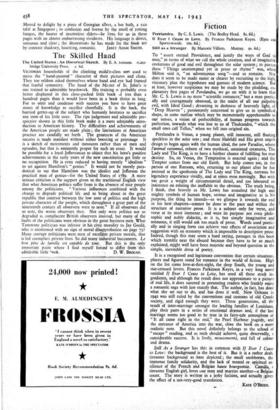Fiction
Perelandra. By C. S. Lewis. (The Bodley Head. 8s. 6d.)
If Ever I Cease to Love. By Frances Parkinson Keyes. (Eyre and Spottiswoode. to& 6d.) Still as a Stranger. By Marjorie Villiers. Murray. 9s. 6d.) To " assert eternal Providence, and justify the ways of God to men," in terms of what we call the whole creation, and of imaginable evolutions of good and evil throughout the solar system; to pursue these " Things unattempted yet in prose or rhyme " was, when Milton said it, " an adventurous song "—and so remains. Nor does it seem to be made easier or clearer by recruiting to the high, visionary plan the hypotheses and guesses of modern science. But at least, however suspicious we may be made by the plodding, ex- planatory first pages of Perelandra, we go on with it to learn that Mr. C. S. Lewis is no mere " scientific romancer," but a man poetic- ally and courageously obsessed, in the midst of all our palpable evil, with Ideal Good ; dreaming in darkness of heavenly light, of " Deep Heaven " ; passionately concerned to give us in symbolical shape, in some outline which may be momentarily apprehensible to our senses, a vision of perfectibility, of human progress towards perfection, towards what was lost to us of Thulcandra, " which the small ones call Tellus," when we fell into original sin.
Perelandra is Venus, a young planet, still innocent, still floating speckless in the solar seas ; and there Maleldil and His great angels design to begin again with the human ideal, the new Paradise, where !'animal rationnel, reborn of two mythical, untainted creatures, The Lady and The King, is to have a further chance of fulfilling his true destiny. So, on Venus, the Temptation is enacted again ; and the Tempter comes from our old Earth. But help comes too, in the person of one Ransom, who, returning to our planet after he has assisted at the apotheosis of The Lady and The King, narrates his legendary experience vividly, and at times even movingly. But with too great a. weight of circumstantial detail, and too laboured an insistence on relating the ineffable to the obvious. The truth being, I think, that bravely as Mr. Lewis has assaulted the high and mighty symbols of human hope, serious and imaginative as is his purpose, the thing he intends—as we glimpse it towards the end in his best chapters cannot be done at the pace and within the structure of narrative prose. It is a subject only for verse, and verse at its most immense ; and were its purpose not even philo- sophic and nobly didactic, as it is, but simply imaginative and sensuous, it still would ask too much of prose. Words used poetic- ally and in singing form can achieve vast effects of association and suggestion with an economy which is impossible to descriptive prose. Indeed, though this may seem a hard saying, passages in this book which tremble near the absurd because they have to be so much explained, might well have been majestic and beyond question in the simple, inevitable dress of poetry.
It is a recognised and legitimate convention that certain situations, places and figures stand for romance in the world of fiction. High on the list come love-at-first-sight, the deep South, the young and star-crossed lovers. Frances Parkinson Keyes, in a very long novel entitled If Ever I Cease to LoVe, has used all these stock in- gredients, and although the result does not approximate to a picture of real life, it does succeed in presenting readers who frankly enjoy a romantic saga with just exactly that. The author, in fact, has done what she set out to do, and has done it well. New Orleans in 1940 was still ruled by the conventions and customs -of . old Creole society, and rigid enough they were. Three generations, all the result of inter-marriage amongst the leadihg families of Louisiana, play their parts in a series of emotional dramas and, if the last marriage seems too good to be true in its fairy-tale atmosphere of " It all came right in the end," the Pearl Harbour tragedy,• and the entrance of America into the war, dose the boo; on a more realistic note. But this novel definitely belongs to the school of " escape " reading, and as such should achieve, quite deservedly, a considerable success. It is lively, mouvernente, and full of colour and drama.
Still As a Stranger has this in common with If Ever I Cease to Love: the background is the best of it. But it is a rather drab, tiresome background as -here depicted • the small snobberies, the immense family solidarity, and the lack of mental or spiritual re- silience of the French and Belgian haute bourgeoisie. Camilla, a tiresome English girl, loves one man and marries another—a Belgian count. The story is written in a jerky fashion, and actually :gives the effect of a not-very-good translation.
. KATE O'BRIEN.


























 Previous page
Previous page